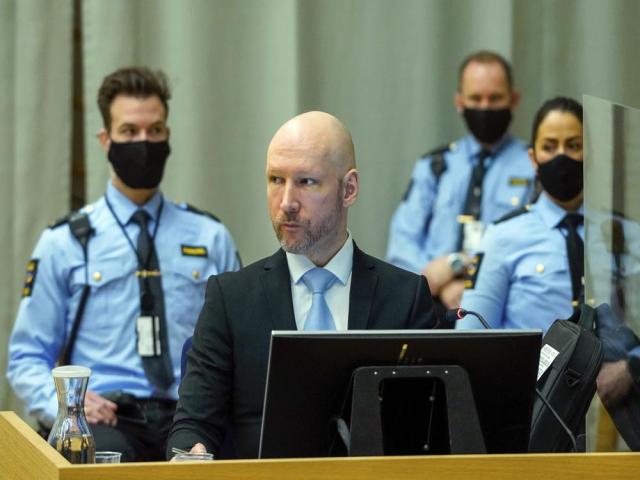Prosecutor: Norway mass killer still ‘a very dangerous man’

A prosecutor in Norway said Thursday that a far-right extremist who killed 77 people in 2011 still is “a very dangerous man” and therefore a poor candidate for release after 10 years in prison, as Norwegian law permits.
On the final day of a three-day parole hearing, prosecutor Hulda Karlsdottir said in her closing argument that Anders Behring Breivik “has not shown any genuine remorse in court” and his behavior there is part of a “PR stunt.”
“In the clear view of the prosecution, Breivik’s request for parole should not be granted,” Karlsdottir said.
Breivik professed white supremacist views and flashed Nazi salutes on the hearing’s opening day, while claiming to have renounced violence. He repeated again Thursday, as he was given the last word, that he was refraining from violence.
His lawyer Øystein Storrvik said in his closing arguments that Breivik should be released to prove that he is reformed and no longer a threat to society, and that is not possible to prove while he is in total isolation.
Storrvik called it “a paradox that a person is treated so badly in prison that he never gets better. He never gets out.”
A psychiatrist who has observed him since 2012 testified Wednesday that Breivik can’t be trusted. A prison official told the judges hearing the parole request “there is an imminent danger” that, if released, Breivik would again commit serious crimes.
Breivik is serving Norway’s maximum 21-year sentence for setting off a bomb in Oslo’s government district and carrying out a shooting massacre at a summer camp for left-wing youth activists. He has three cells to himself in the high-security wing of Skien prison. The cells are equipped with video game consoles, a television, a DVD player, electronic typewriter, newspapers and exercise machines. He also has daily access to a larger exercise yard.
In 2016, he sued the government, saying his isolation from other prisoners, frequent strip searches and the fact that he was often handcuffed during the early part of his incarceration violated his human rights.
He was declared criminally sane at his trial, although the prosecution argued that he was psychotic. He didn’t appeal his sentence but unsuccessfully sued the government for human rights violations for denying him the right to communicate with sympathizers.
Although Norway’s maximum prison sentence is 21 years, Breivik could be held longer under a provision that allows authorities to keep criminals in prison for as long as they’re considered a menace to society.
The three-judge Telemark District Court is expected to rule on his parole request later this month.
A repair ship is being sent from Papua New Guinea to work on the undersea cable, but it will take some time to get to Tonga and the company in charge estimates it could take longer than a month to repair the line.
Given that the cable runs right through the volcanic zone, any new volcanic activity could completely scupper even that timeline.
For Liutai, who runs a business in Tonga, regular visits had allowed him to stay in close touch in the past, but with COVID-19 pandemic travel restrictions, he has come to rely on video calls like many other Tongans living abroad.
With that possibility now cut off, at least for the near future, he’s hoping at least better telephone connections will soon be available so that the 106,000 residents of Tonga can better reach the outside world to tell their friends and family what’s going on.
“It’s something we’ve become so used to, talking to each other and sharing information with the ease of social media,” the 52-year-old said. “But when something scary has happened and you fear the worst, and even the government statement was general with no information, we were all nervous wrecks.”
As the ash cleared, satellite communication improved and Tonga’s telecoms operator, Digicel, said it had been able to restore international call services to some areas late Wednesday.
It cautioned, however, that due to the high number of calls and the limited capacity of its satellite link that people may need to try repeatedly to get through — something experienced by Liutai, who is deputy president of the Tonga Australia Chamber of Commerce.
“My first direct information was this morning,” he said Thursday. “My daughter, after 100 phone calls during the day and night, got through to my aunties, my mum’s sisters, and we were in tears of joy — it was three in the morning, but for us it was like the middle of the day; we were so pumped and so happy.”
So far, three people have been confirmed killed after the volcanic eruption 64 kilometers (40 miles) north of Tonga’s capital, Nuku’alofa, and the tsunami that followed. Several small settlements in outlying islands were wiped off the face of the map, according to the Red Cross and official reports, necessitating the evacuation of several hundred residents.
With the resumption of some communications, more photos have begun to emerge of the destruction, showing the once-verdant islands turned a charcoal black by a thick coating of volcanic dust.
Coastlines are strewn with debris, while people work to clean streets and walkways.
The 2-centimeter (0.78 inch) layer of ash that rendered the runway at Fua’amotu International Airport unusable has now been cleared, and the first flights carrying fresh water and other aid arrived Thursday.

Review of Lenovo ThinkBook 14s G2 ITL: Fast, Economical, Tough
- We are back with a review unit from Lenovo Indonesia, namely the Lenovo ThinkBook 14s ITL G2. The Lenovo ThinkBook 14s is a mid-range business

Laptop Uses And Advantages in The Modern World
- Tendency to rapid overheating, low maintainability, high price for comparable power.

NASA asks Nokia to provide 4G LTE on the moon, for what?
- Even though it no longer produces its own cellphones or smartphones, Nokia will still benefit from the communication technology business.

Why Brand Managers Need Content Moderation
- UGC, according to nearly 72 percent of brands, helps them connect with their customers and cultivates